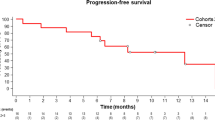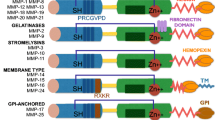Abstract
The anti-metastatic efficacy of MMI-166, which is a selective matrix metalloproteinase (MMP) inhibitor, in combination with CPT-11 was examined using two metastasis models of human gastrointestinal cancer cells. In the liver metastasis model, C-1H human colon cancer cells were injected into the spleen of athymic BALB/c nude mice. Daily oral (p.o.) dosing of MMI-166 at 200 mg/kg starting 1 day after tumor inoculation led to a significantly prolonged survival effect by inhibiting liver metastasis of C-1H tumor cells. CPT-11 (5 or 20 mg/kg) was administered intraperitoneally (i.p.) three times on day 3, day 7 and day 11 and also improved the survival of tumor-inoculated mice compared with the vehicle control. When MMI-166 was combined with CPT-11, the anti-metastatic efficacy was significantly augmented. Moreover, long tumor-free survival was noted in two of eight mice that were given the combination therapy but not either MMI-166 or CPT-11 monotherapy. In the peritoneal dissemination model, TMK-1 human gastric cancer cells were injected i.p. into nude mice. While both MMI-166, administered daily p.o. from day 1 at 200 mg/kg, and CPT-11, administered intravenously (i.v.) three times, inhibited the tumor dissemination and growth, the combination therapy of MMI-166 plus CPT-11 showed a greater inhibitory effect than each monotherapy. A hematotoxicity study demonstrated that CPT-11 alone significantly decreased the number of white blood cells (WBC) and bone marrow cells (BMC) in the mice during treatment, while the daily administration of MMI-166 alone had no such effect. More importantly, the combination therapy of MMI-166 with CPT-11 did not augment the hematotoxicity caused by CPT-11. An in vitro cytotoxicity study showed that MMI-166 itself neither has direct cytotoxicity in C-1H and TMK-1 tumor cells, nor does it augment the cytotoxicity of SN-38, an active form of CPT-11. The findings indicate that the augmented anti-metastatic efficacy in combination treatment was not simply due to the augmentation of direct cytotoxic activity, but was rather an additive or synergistic effect of anti-metastatic activities with different mechanisms. In conclusion, we demonstrated that the anti-metastatic efficacy against C-1H colon cancer and TMK-1 gastric cancer were augmented by the combination therapy of MMI-166, an orally active MMP inhibitor, with CPT-11. However, the hematotoxicity caused by CPT-11 was not augmented in the combination with MMI-166. Thus, the combination therapy of MMI-166 and CPT-11 exhibited potent anti-metastatic efficacy without increased hematotoxicity. These results point to the clinical advantage of using MMI-166 in combination with CPT-11.
Similar content being viewed by others
References
Winder N, Semple JP, Welch WR et al. Tumor angiogenesis and metastasis: Correlation in invasive breast carcinoma. N Engl J Med 1991; 324: 1–8.
MacDougall JR and Matrisian LM. Contributions of tumor and stromal matrix metalloproteinases to tumor progression, invasion and metastasis. Cancer Metastasis Rev 1995; 141: 351–62.
Gastl G, Hermann T, Steurer M et al. Angiogenesis as a target for tumor treatment. Oncology 1997; 54: 177–84.
Mousa SA. Mechanisms of angiogenesis in vascular disorders: Potential therapeutic targets. Drugs Ft 1998; 23: 51–60.
Folkman J. Seminars in Medicine of the Beth Israel Hospital, Boston. Clinical applications of research on angiogenesis. N Engl J Med 1995; 333: 1757–63.
Ingber DE, Folkman J. How does extracellular matrix control capillary morphogenesis? Cell 1989; 58: 803–5.
Itoh T, Tanioka M, Yoshida H et al. Reduced angiogenesis and tumor progression in gelatinase A-deficient mice. Cancer Res 1998; 58: 1048–51.
Itoh T, Tanioka M, Matsuda H et al. Experimental metastasis suppressed in MMP-9-deficient mice. Clin Exp Metastasis 1999; 17: 177–81.
Ray JM, Steler-Stevenson WG. Matrix metalloproteinase and malignant disease: Recent developments. Exp Opin Invest Drugs 1996; 5: 323–35.
Wojtowicz-Praga SM, Dickson RB, Hawkins M. Matrix metalloproteinase inhibitors. Invest New Drugs 1997; 15: 61–75.
Brown PD. Matrix metalloproteinase inhibitors in the treatment of cancer. Med Oncol (London) 1997; 14: 1–10.
Wang X, Fu X, Brown PD et al. Matrix metallorproteinase inhibitor (BB-94) (batimastat) inhibits human colon tumor growth and spread in a patient-like otrthotopic model in nude mice. Cancer Res 1994; 54: 4726–8.
Chirivi RG, Garofalo A, Crimmin MJ et al. Inhibition of the metastaic spread and growth of B16-BL6 murine melanoma by a synthetic matrix metalloproteinase inhibitor. Int J Cancer 1994; 58: 460–4.
Lozonschi L, Sunamura M, Kobari M et al. Controlling tumor angiogenesis and metastasis of C26 murine colon adenocarcinoma by a new matrix metalloproteinase inhibitor, KB-R7785, in two tumor models. Cancer Res 1999; 59: 1252–8.
An Z, Wang X, Willmott N et al. Conversion of highly malignant colon cancer from an aggressive to a controlled disease by oral administration of a metalloproteinase inhibitor. Clin Exp Metastasis 1997; 15: 184–95.
Santos O, McDermontt CD, Daniels RG et al. Rodent pharmacokinctic and anti-tumor efficacy studies with a series of synthetic inhibitors of matrix metalloproteinases. Clin Exp Metastasis 1997; 15: 499–508.
Flynn C, Bull C, Eberwin D et al. Anti-metastatic activity of BAY 12-9566 in a human colon carcinoma HCT-116 orthotopic model. Proc Am Assoc Cancer Res 1998; 39: 2057.
Talbot DC, Brown PD. Experimental and clinical studies on the use of matrix metalloproteinase inhibitors for the treatment of cancer. Eur J Cancer 1996; 32A: 2528–33.
Coleman SG. Matrix metalloproteinase inhibitors. Drugs R&D 1999; 1: 131–4.
Price A, Shi Q, Morris D et al. Marked inhibition of tumor growth in malignant glioma tumor model by a novel synthetic matrix metalloproteinase inhibitor AG3340. Clin Cancer Res 1999; 5: 8545–54.
Rowinsky E, Humphrey, R, Hmmond LA et al. Phase I and pharmacologic study of the specific matrix metalloproteinase inhibitor BAY 12–9566 on a protracted oral daily dosing schedule in patients with solid malignancies. J Clin Oncol 2000; 18: 178–86.
Levitt NC, Eskens FALM, O'Byrne KJ et al. Phase I and pharmacological study of the oral matrix metalloproteinase inhibitor, MMI270 (CGS16949A), in patients with advanced solid cancer. Clin Cancer Res 2001; 7: 1912–22.
Tamura Y, Watanabe F, Nakatani T et al. Highly selective and orally active inhibitors of type IV collagenase (MMP-9 and MMP-2): Nsulphonylamino acid derivatives. J Med Chem 1998; 41: 640–9.
Maekawa R, Maki H, Yoshida H et al. Correlation of antiangiogenesis and antitumor efficacy of N-biphenyl sulphonyl-phenylalanine hydroxiamic acid (BPHA), an orally-active, selective matrix metalloproteinase inhibitor. Cancer Res 1999; 59: 1231–5.
Maekawa R, Maki H, Wada T et al. Anti-metastatic efficacy and safety of MMI-166, a selective matrix metalloproteinase inhibitor. Clin Exp Metastasis 2000; 18: 61–6.
Matsushita A, Onda M, Uehida E et al. Antitumor effect of a new selective matrix metalloproteinase inhibitor, MMI-166, on experimental pancreatic cancer. Int J Cancer 2000; 92: 434–40.
Ohta M, Konno H, Tanaka T et al. Effect of combination therapy with matrix metalloproteinase inhibitor MMI-166 and mitomycin C on the growth and liver metastasis of human colon cancer. Jpn J Cancer Res 2001; 92: 688–95.
Anderson IC, Shipp MA, Docherty AJP et al. Combination therapy including a gelatinase inhibitor and cytotoxic agent reduces local invasion and metastasis of Lewis lung carcinoma. Cancer Res 1996; 56: 715–8.
Shalinsky DR, Brekken J, Zou H et al. Marked antiangiogenic and antitumor efficacy of AG3340 in chemoresistant human non-small cell lung cancer tumors: single agent and combinatin chemotherapy studies. Clin Cancer Res 1999; 5: 1905–17.
Shalinsky DR, Brekken J, Zou H et al. Broad antitumor and antiangiogenic activities of AG3340, a potent and selective MMP inhibitor undergoing advanced oncology clinical trials. Ann NY Acad Sci 1999; 878: 236–70.
Igarashi N, Kubota T, Otani Y et al. Preventive effect of matrix metalloproteinase inhibitor, R-94138, in combination with mitomycin C or cisplatin on peritoneal dissemination of human gastric cancer cell line TMK-1 in nude mice. Jpn J Cancer Res 1999; 90: 116–21.
Haq M, Shafii A, Zervos EE et al. Addition of matrix metalloproteinase inhibition to conventional cytotoxic therapy reduces tumor implantation and prolongs survival in a murine model of human pancreatic cancer. Cancer Res 2000; 60: 3207–11.
Zucker S, Lysik RM, Zarrabi MH et al. Mr. 92,000 type IV collagenase is increased in plasma of patients with colon cancer and breast cancer. Cancer Res 1993; 53: 140–6.
Otani Y. The collagenases activities, interstitial collagenase and Type IV collagenase, in human stomach cancer: With special reference to local spreading and lymph node metastasis. Keio J Med 1990; 39: 159–67.
Alley MC, Scudiero DA, Monks A et al. Feasibility of drug screening with panels of human tumor cell lines using a microculture tetrazolium assay. Cancer Res 1988; 48: 589–601.
Bradley TR, Metcalf D. The growth of mouse bone marrow cells in vitro. Aust J Exp Biol Med Sci 1966; 44: 287–99.
Davies B, Brown PD, East N et al. A synthetic matrix metalloproteinase inhibitor decreases tumor burden and prolongs survival mice bearing human ovarian carcinoma xenografts. Cancer Res 1993; 53: 2087–91.
Naito K, Kanbayashi N, Nakajima S et al. Inhibition of growth of human tumor cells in nude mice by a metalloproteinase inhibitor. Int J Cancer 1994; 58: 730–5.
Watson SA, Morris TM, Robinson G et al. Inhibition of organ invasion by the matrix metalloproteinase inhibitor Batimastat (BB-94) in two human colon carcinoma metastasis models. Cancer Res 1995; 55: 3629–33.
Conway JG, Trexler SJ, Wakefield JA et al. Effect of matrix metalloproteinase inhibitors on tumor growth and spontaneous metastasis. Clin Exp Metastasis 1996; 14: 115–24.
Giavazzi R, Garofalo A, Ferri C et al. Batimastat, a synthetic inhibitor of matrix metalloprtoteinases, potentiates the antitumor activity of cisplatin in ovarian carcinoma xenografts. Clin Cancer Res 1998; 4: 985–92.
Teicher BA, Dupuis NP, Robinson MF et al. Antiangiogenic treatment (TNP-470/minocycline) increases tissue levels of anticancer drugs in mice bearing Lewis lung carcinoma. Oncol Res 1995; 7: 237–43.
Author information
Authors and Affiliations
Rights and permissions
About this article
Cite this article
Maki, H., Hojo, K., Tanaka, H. et al. Augmented anti-metastatic efficacy of a selective matrix metalloproteinase inhibitor, MMI-166, in combination with CPT-11. Clin Exp Metastasis 19, 519–526 (2002). https://doi.org/10.1023/A:1020321210623
Issue Date:
DOI: https://doi.org/10.1023/A:1020321210623




